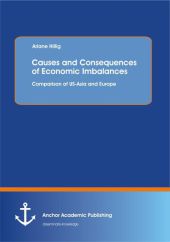 Neuerscheinungen 2014Stand: 2020-02-01 |
Schnellsuche
ISBN/Stichwort/Autor
|
Herderstraße 10
10625 Berlin
Tel.: 030 315 714 16
Fax 030 315 714 14
info@buchspektrum.de |

Ariane Hillig
Causes and Consequences of Economic Imbalances: Comparison of US-Asia and Europe
Ungekürzte Ausgabe. 2014. 86 S. 27 Abb. 220 mm
Verlag/Jahr: ANCHOR ACADEMIC PUBLISHING 2014
ISBN: 3-9548923-8-3 (3954892383)
Neue ISBN: 978-3-9548923-8-9 (9783954892389)
Preis und Lieferzeit: Bitte klicken
In the past ten years, huge economic imbalances among US-Asia as well as eurozone countries have built up which have led to numerous crisis situations. Thus, the goal of this book is to find out if economic imbalances are sustainable or if they need to be rebalanced? What role do distinct national policies play? The author is going to compare the imbalances of US-China with the intra-euro imbalances of Germany, Spain and Italy. Firstly, the historical development of the economic imbalances is presented in order to point out the unprecedented height of the mentioned imbalances. Furthermore, the author is analyzing the causes of imbalances by presenting the development of the competitiveness, the saving-/investment rates, the financial markets as well as the different national policies. It is shown that distinct national policies were the underlying causes for the development of such high economic imbalances. After having seen the historical development as well as the causes, the author describes the possible costs and benefits of having imbalances as well as the implications of the global financial crisis and the current European crisis. Due to the increasing globalization, the financial crisis spread fast and led to huge losses and decreasing investor s trust in European countries. This resulted in the European crisis which subsequently could also endanger the global economy. Because of the huge crisis impact, traditional and alternative balancing channels are also compared. Despite supporting measures such as restrictive fiscal policies and financial assistance, Europe is still suffering from an economic downturn whereas the US returned to a slow economic recovery. At the end, the author concludes that global imbalances need to be rebalanced in order not to avoid reaching an unsustainable level. The occurring as well as rebalancing of economic imbalances highly depends on distinct national policies. Unless the international coordination and cooperation increases, economic imbalances will continue to occur and will lead to economic crises when reaching an unsustainable level.


